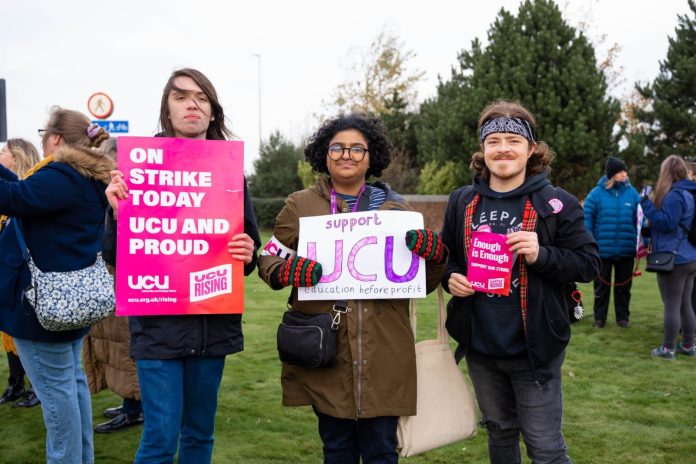Annanya, Edge Hill Socialist Students
Staff in my university were part of the University and College Union (UCU) strikes. We were honoured to be invited to their picket lines and have a chat with them. I interviewed three UCU members on strike about their experiences and the reality of higher education.
When asked the reasons behind strike action, a senior lecturer responded that the action is about pay and conditions as well as how higher education is being treated.
A reader said that her motivation was her sadness and the lack of care given to workers. Her values of justice, fairness and integrity would not allow her to stand by and do nothing.
Strike action came after serious consideration. Workers do not get paid on strike days, they lose more money.
But as a member described: “It is a last resort. You can’t just sit back. You have to sacrifice something.”
Another senior lecturer is also a personal tutor to 35 students. She complained that a 3% pay rise was offered, while inflation is well above 12%.
Higher education is becoming commodified. Universities are cutting staff, while increasing the number of students to increase their margin.
This lecturer said that she cannot manage being a personal tutor to 35 students. She would prefer to cut it down to 20, so she would have the space and time to provide the support they need.
Workload is constantly increasing. This UCU member described that the typical workload was understood as 40% teaching, 40% research and 20% admin. But now admin has been increased to 40%, forcing her to do her research on weekends and evenings, out of work hours. Increased workload is causing mental health issues for lecturers, and taking them away from the core activities of teaching.
Secure employment contracts are decreasing. Education is becoming a ‘gig economy’.
Poorly paid
Graduate teaching assistants are paid poorly, used as cheap labour, and given short-term contracts. Workers early in their career often have contracts with more than one institution, forced to work for multiple employers to get work.
In real terms, pay has been decreasing for a decade. New academics start on low wages, after paying thousands of pounds in tuition fees.
Increasing pay discrepancies is creating a sense of injustice. Vice-chancellors get bloated salaries, but the rest of the staff are in financial instability.
One senior lecturer informed us that universities are forced to operate in an artificial market of competitiveness, imposed by successive governments. Increasing commodification means the priority is figures and rankings, instead of students and education.
Employability targets force universities to narrow their subjects, with the aim of preparing students for very few specific jobs. This limits our ability to shape our own future.
The introduction of tuition fees also meant that the cost of education is borne by students who leave university with tens of thousands of pounds of debt. Poor working conditions and commercialisation leads to poor student experiences, and lack of adequate support for us.
Many striking lecturers have been in education before tuition fees and student loans were introduced. For us students, it is hard to imagine university without them.
But many university workers have lived through better conditions. They know it is possible to improve higher education for workers and students, and free it from the irrational demand of capitalism to create constant profit.
Education is an essential right. We must support the UCU in their fight for a higher education system that respects and values its workers and students.







